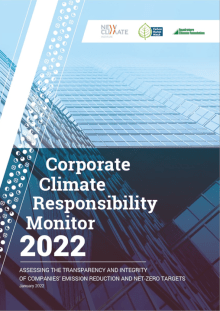
Water Conservation: 7 Simple Ways to Save Water at Home and in Your Business
Water is one of our most precious resources, yet it is often wasted without thought. ...

Thirteen companies out of total 25 companies – analyzed by The Corporate Climate Responsibility Monitor – are committed to reduce their full value chain emissions from 2019 by only 40% on average.
But just 3 of the 25 companies – Maersk, Vodafone and Deutsche Telekom – clearly commit to deep decarbonization of over 90% of their full value chain emissions by their respective net-zero and zero emission target years.
At least 5 of the companies only commit to reduce their emissions by less than 15%, often by excluding upstream or downstream emissions.
The other 12 companies do not accompany their headline pledges with any specific emission reduction commitment for their that target year. Collectively, the 25 companies specifically commit to reducing only less than 20% of their 2.7 GtCO2e emission footprint, by their respective headline target years.
The 25 firms assessed in this report are major multinational companies. Their total self-reported GHG emission footprint in 2019 amount to approximately 2.7 GtCO2e. This is equivalent to roughly 5% of global GHG emissions.
The Corporate Climate Responsibility Monitor, conducted by NewClimate Institute in collaboration with Carbon Market Watch, assesses the climate strategies of 25 major global companies. It critically analyzes the extent to which they demonstrate corporate climate leadership.
The Corporate Climate Responsibility Monitor focuses on four main areas of corporate climate action: tracking and disclosure of emissions, setting emission reduction targets , reducing own emissions and taking responsibility for unabated emissions through climate contributions or offsetting. Finally, it evaluates 25 major global companies’ transparency and integrety across these four areas.
Companies around the world are increasingly alert to the climate emergency, facing calls from a growing range of stakeholders to take responsibility for the environmental impact of their activities. Most large companies now have public climate strategies and targets, many of which include pledges that, on the face of it, appear to significantly reduce, or even eliminate, their contributions to global warming.
The rapid acceleration of corporate climate pledges, combined with the fragmentation of approaches means that it is more difficult than ever to distinguish between real climate leadership and unsubstantiated greenwashing. This is compounded by a general lack of regulatory oversight at national and sectoral levels. Identifying and promoting real climate leadership is a key challenge that, where addressed, has the potential to unlock greater global climate change mitigation ambition.
اترك تعليقا